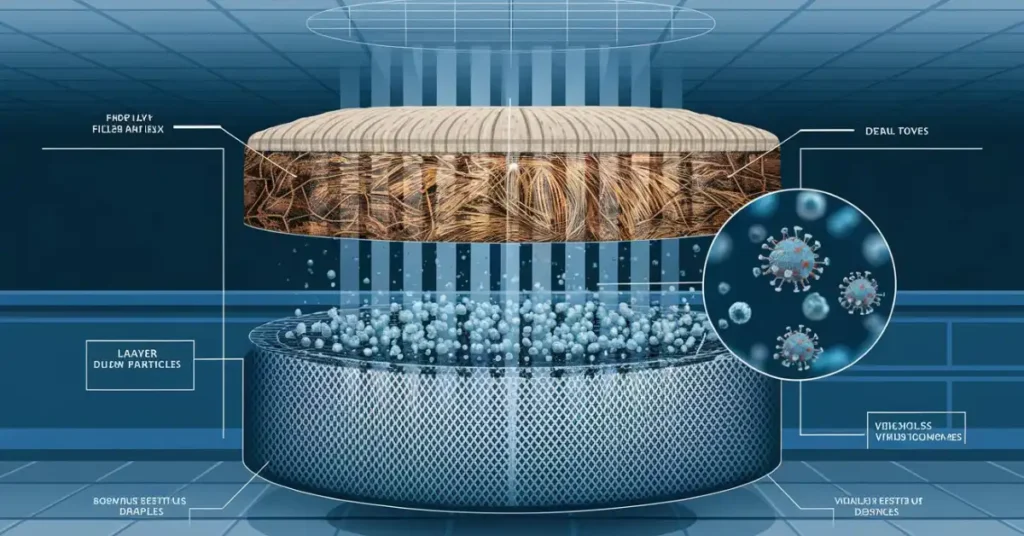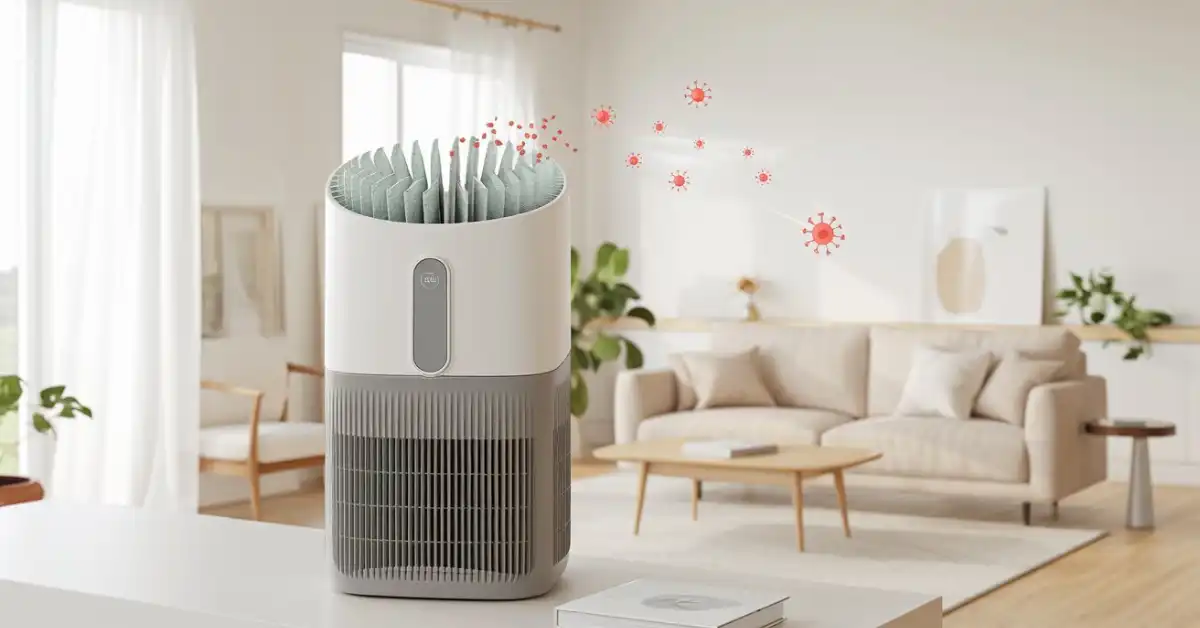Indoor air quality is very important for our health, especially in residential spaces, closed-in spaces, crowded spaces, and high-traffic areas. With the rise of concerns over airborne particles and the spread of contagious viruses like SARS-CoV-2 and flu viruses, many people wonder:
Do HEPA filters remove viruses? In this article, we will explore how HEPA filters work, discuss their efficiency in removing microscopic particles and harmful particles, and provide practical tips on choosing the best air purifier and air filter product for your needs.
Quick Summary:
HEPA filters are designed to capture tiny airborne particles. They are very effective at trapping larger particles and many microscopic particles. However, the effectiveness of a filter in removing virus particles depends on several factors such as the filter’s design, the type of virus, and proper maintenance..
How Do HEPA Filters Work?
HEPA filters work by forcing air through a mat of very fine fibres. These fibres capture particles using three main physical mechanisms:
- Interception: Particles that come close enough to a fibre stick to it.
- Impaction: Larger particles that cannot follow the airstream curve around the fibre collide with it and become trapped.
- Diffusion: Very small particles move randomly (due to Brownian motion) and eventually hit a fibre.

Even though many viruses are smaller than 0.3 microns in size, they often do not travel alone. Virus particles usually hitch a ride on aerosol particles or droplets from an infected person’s cough or sneeze. These droplets are much larger than the virus alone, making them easier for HEPA filters to capture.
In other words, even though a typical coronavirus may be around 0.1 microns, when it is contained within a droplet or attached to a larger particle, a HEPA filter can trap it along with the other unwanted particles.
Do HEPA Filters Remove Viruses?
Now to answer the big question: Do HEPA filters remove viruses? The answer is mostly yes—but with some important details. HEPA filters are very effective at capturing virus particles when those viruses are attached to larger aerosol particles.
Viruses like SARS-CoV-2 (the virus that causes COVID-19) and flu viruses are often carried in droplets or on dust particles that are larger than 0.3 microns. Therefore, HEPA filters can trap many of these airborne viruses as they pass through an air purifier.
However, there are a few points to consider:
- Virus Size vs. Droplet Size: Although the virus itself might be very small (for example, SARS-CoV-2 is about 0.1 microns), it is usually contained in droplets that are much larger. This means that while the particle size of the virus alone might be below the HEPA filter’s rated size, the droplets or carrier particles are not.
- Removal vs. Inactivation: HEPA filters are excellent at removing virus particles from the air by trapping them on the filter surface. They do not, however, kill or inactivate the viruses. The viruses remain on the filter until the filter is cleaned or replaced. This is why it is important to manage dirty filters properly.
- Air Purifier Design: The effectiveness of the air filter product depends not only on the HEPA filter itself but also on the design of the air purifier, including the motor technology and how well the air circulates in the room. Choosing a high-quality air filter that is the right size for your indoor spaces ensures that air flows properly and viruses are efficiently captured.
The Science Behind Virus Removal
Several studies have shown that HEPA filters can significantly reduce the concentration of airborne viruses. Researchers have found that:
- HEPA filters can capture at least 99.97% of airborne particles, including SARS-CoV-2 viral particles, when these viruses are in droplets or attached to other particles.
- Laboratory experiments demonstrate that air purifiers equipped with HEPA filters reduce virus particles from the air by removing both microscopic particles and aerosol particles.
- In real-world settings such as residential spaces or hospital wards, the use of HEPA filters has been associated with lower concentrations of contagious viruses and airborne bacteria.
While HEPA filters are highly effective, they are part of a broader strategy. For example, some air purifiers combine HEPA filters with ultraviolet (UV) light or activated carbon filters. The UV light may help inactivate viruses that are trapped, while carbon filters help remove odors and volatile organic compounds (VOCs) from the air. This layered approach enhances the overall effectiveness of the filter and improves indoor air quality.
Benefits and Limitations
Benefits
Using HEPA filters in air purifiers offers many advantages:
- Improved Indoor Air Quality: By removing dust, pollen, airborne bacteria, and virus particles, HEPA filters can create cleaner air in closed-in spaces and residential environments.
- Reduced Risk of Airborne Disease Transmission: In high-traffic spaces and crowded areas, effective air filtration technology can help lower the concentration of viruses and reduce the transmission of viruses like the COVID-19 coronavirus.
- Ease of Use: Many modern air purifiers are designed for easy maintenance with features like filter replacement indicators and filter subscription options to help ensure you always have a fresh filter on hand.
- Versatility: HEPA filters work well in various settings, including homes, offices, and schools. They are especially useful in environments where natural ventilation is limited.
Limitations
Despite their many benefits, HEPA filters have some limitations:
- They Do Not Kill Viruses: While HEPA filters trap viruses, the viruses may remain active on the filter surface. This means that a replacement filter should be installed regularly to avoid any potential risks associated with a dirty filter.
- Maintenance Costs: The cost of air filter replacements can add up over time. It is important to consider this when buying an air purifier. Some manufacturers offer a filter subscription option to make regular replacement easier.
- Not a Standalone Solution: HEPA filters are most effective when used as part of a broader strategy that includes proper ventilation, regular cleaning, and other air cleaning measures.
- Airflow and Room Size: An air purifier’s efficiency air filter performance depends on the size of the room and the device’s clean air delivery rate (CADR). Choosing a unit that is too small for your space may result in less effective removal of airborne viruses and unwanted particles.
Overall, while HEPA filters are a powerful tool in reducing particle pollution—including virus particles—they should be seen as one part of a comprehensive approach to maintaining healthy indoor air quality.
Tips for Maintaining HEPA Filters
To ensure your HEPA filter remains effective, follow these tips:
- Regular Replacement: Replace your HEPA filter or clean your pre-filters according to the manufacturer’s recommendations. A replacement filter should be installed before the old one becomes too dirty.
- Monitor Filter Life: Many air purifiers come with a digital display or app that shows the remaining life of the filter. This helps you plan for air filter replacements and manage the cost of the air filter over time.
- Use a Filter Subscription Option: Some companies offer subscription services that deliver new filters on a regular schedule. This ensures you always have a fresh filter and helps maintain effective air filtration technology in your indoor spaces.
- Keep the Unit Clean: Dust and debris can accumulate on the outside of the unit and on the fan. Keeping the device clean helps maintain the performance of both the motor technology and the air filter product.
- Correct Placement: Place your air purifier in a location with good airflow. Avoid placing it directly against a wall or in a corner to ensure that air passes freely through the filter. A clear, central location in a room (or closed-in space) enhances the device’s efficiency.
By following these steps, you can maximize the benefits of your HEPA filter and ensure that it continues to capture harmful particles and airborne viruses effectively.
Conclusion
HEPA filters are an amazing technology for improving indoor air quality. They work hard to remove airborne particles, including harmful particles, airborne viruses, and even SARS-CoV-2 particles from the air.
Although no air purifier filter can guarantee 100% removal of every microscopic particle, using a high-quality air filter in your air purifier can greatly reduce the risk of virus transmission and improve your environment.
By choosing the right type of filter for your needs and ensuring proper care and placement, you can enjoy cleaner air—even in crowded, closed-in spaces. Whether you are looking to protect yourself in high-traffic spaces or simply want to breathe easier at home, HEPA filters offer a reliable and effective solution.
References
- Live Science – Do HEPA Filters Remove Viruses?
- ISO-Aire – Can HEPA Air Filtration Stop Viruses?
- U.S. Environmental Protection Agency – Air Cleaners, HVAC Filters, and Coronavirus (COVID-19)
- Wikipedia – HEPA

